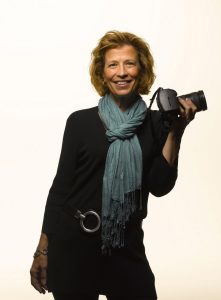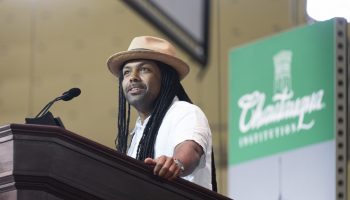
Forty years have passed since Annie Griffiths picked up a camera for the first time. She has now traveled to nearly 150 countries with one in hand, finding it hard not to think about how her life differs from that of those she photographs.
But Griffiths isn’t one to dwell on the discomfort — instead she focuses on what she has in common with her subjects to tell a story far beyond what her lens can see.
Griffiths, National Geographic photographer and founder of Ripple Effect Images, will open the 2019 morning lecture series at 10:45 a.m. today in the Amphitheater with a lecture on the theme “Moments That Changed the World.”
“I am always professional, but that doesn’t mean I am devoid of emotion, contact or intimacy with my subjects,” Griffiths said. “How can I tell an intimate story without investing the time, the energy and the heart it requires?”
Griffiths had always planned on becoming a journalist, but the photo aspect took more time to develop. While attending the University of Minnesota, she decided to take a class to learn how to use a camera. Within two weeks, she changed her major to photojournalism and embarked on a journey she said felt just like “falling in love with a person.”
“When you fall in love, or you find your passion, you just pour everything into it,” she said. “At that time, I figured I was late to the party, so I very much threw my full attention at trying to become better, get published and make a career out of it.”
She started her career in newspapers, first as a staff photographer for The Minnesota Daily and then The Worthington Daily Globe. When she was hired by National Geographic at 25 years old, she was one of the first female photographers and the youngest to have been hired in the publication’s history, an honor she said was both “terrifying and exciting.”
“I think when you have an extraordinary opportunity, before you have real confidence, you are just sure you’re going to blow it,” Griffiths said. “I think that is true of any profession. There is a part of you that says ‘OK, they’ve made a terrible mistake. I hope they don’t figure it out, but I can’t do this. I should not be here.’ ”
The transition from traditional newspapers to National Geographic, a magazine with a “legacy of trust to uphold,” came with a great deal of responsibility.
“When you’re working in the Western world, people know that National Geographic is quality stuff, but when you’re working in the developing world, most people have never heard of it, so it is a different challenge to earn their trust through the way you present yourself and how you enter their world with respect,” she said.
This will be Griffiths’ third time lecturing at Chautauqua Institution. The positive feedback she received from her first lecture in 2009 inspired her to found Ripple Effects Images, a nonprofit collective of top photographers and videographers dedicated to covering aid programs that empower women and girls in the developing world.
Her team has defined seven different areas to address in their coverage: water, food, health, education, economic empowerment, energy and climate change.
“From those areas of expertise we work really hard to find organizations that are doing a great job and that need a little boost,” she said. “We try to bring in a representative look at the globe and try to cover all of those seven pillars that we feel are essential for women to move forward.”
Griffiths believes her perspective as a woman is what allows her to gain access into the lives of the women she’s capturing.
“I understand gestures and body language and humor and fear, all things that help me navigate women of different cultures,” Griffiths said. “Then I just try to listen really well and learn about the things I don’t understand. Even though I am a woman and I am a mother, I am bizarre. In most cultures, I am the only white person there, we don’t speak the language, often they have absolutely no idea why I would be there. There are a lot of unknowns, but at least there is that common thing that helps earn their trust.”
When deciding on a topic to present for her visit to the Institution, Griffiths chose a ripple effect in her own life that she hopes will represent the way people across the world are unknowingly connected.
“There was a tragic moment in my life that then had a ripple effect that very few people knew about, but I experienced it because I travel and because I am reporting from other parts of the world,” she said. “To my surprise — and my horror — that ripple effect was happening to people that had nothing to do with anything going on. It is that kind of connectivity that I am going to talk about, about how we really are connected to everyone else on the planet.”
In addition to Griffiths’ adaptation of the Week One theme, Matt Ewalt, vice president and Emily and Richard Smucker Chair for Education, said he believes her role as a photojournalist is world-changing in and of itself.





